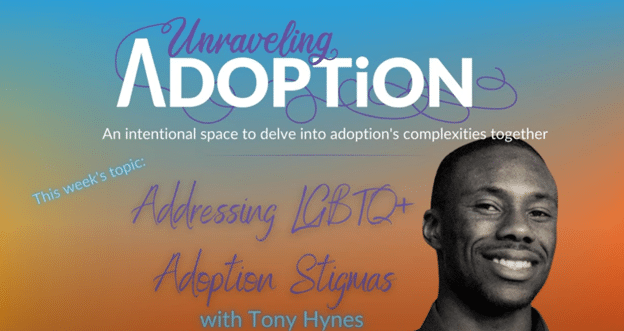Unraveling Adoption: Addressing LGBTQ+ Adoption Stigmas
Unraveling Adoption: Addressing LGBTQ+ Adoption Stigmas
By Tony Hynes
In this guest post, we invited our C.A.S.E. colleague, Tony Hynes to reflect on his discussion with Beth Syverson, host of the podcast, Unraveling Adoption to talk about the challenges he faced being raised in an LGBTQ+ adoptive household.
In 2023, I participated in a discussion with Beth Syverson, host of Unraveling Adoption, to talk about the challenges I faced being raised in an LGBTQ+ adoptive household. As an interracial adoptee, I have been given many opportunities to speak about the impact being raised in a racially diverse adoptive household has had on my life. However, I have had fewer opportunities to discuss what being raised by LGBTQ+ parents meant for me growing up.
During our conversation, I was able to address that LGBTQ+ families in the United States face discrimination and prejudice that often goes unrecognized because of the influx of LGBTQ+ representation in media over the last 20 years. Growing up, I experienced people saying negative things about my family, an experience that Beth, an LGBTQ+ identifying adoptive parent, also shared her son was experiencing in adolescence.
Many strides for the rights of LGBTQ+ families have been made, however, there is still much work to be done. Regarding adoption, Beth spoke about how being raised in an LGBTQ+ adoptive household adds an extra layer of difference to the life of her son. He, like myself, already has LGBTQ+ parents, a layer of difference. On top of that, he is also an adoptee, an additional layer of difference from his peers. The curious, sometimes uncomfortable questions that I got, and the questions that Beth mentioned her son also receiving, frequently point to those layers of difference, forcing the person receiving questions to think not only about what their adopted status means to them but also what their adopted status in an LGBTQ+ family means to them as well.
Later in the conversation, Beth and I discussed what LGBTQ+ adoptive parents can do to best support their children at home, in school, and their communities. I brought up how parents of families like mine need to discuss the LGBTQ+ civil rights movement with their children, affirm LGBTQ+ identities, and introduce their children to any LGBTQ+ friends they may have. In addition, the importance of parents speaking with their children about how they would like to answer some of those difficult, uncomfortable, or prejudiced questions their children get was also discussed, in addition to how they can advocate for their children in their communities. In my own life, I found that as I grew older, I wanted to be in a community with friends and loved ones who understood that to love and respect me was also to love and respect my family and families like mine.
Our conversation concluded by addressing intersectionality about race, sexuality, grief, and loss in adoption. LGBTQ+ families are both more likely to adopt and more likely to adopt interracially than the general population. LGBTQ+ children are also more likely to face family rejection and spend and spend time in the foster care system, making our conversation, and conversations like it, vital for LGBTQ+ families.

